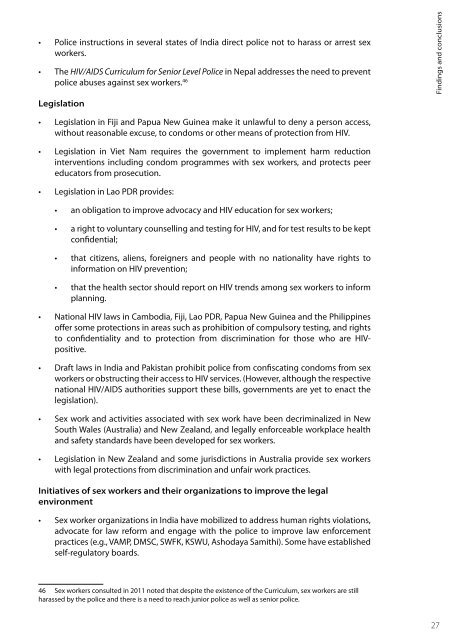SEX WORK AND THE LAW - HIV/AIDS Data Hub
SEX WORK AND THE LAW - HIV/AIDS Data Hub
SEX WORK AND THE LAW - HIV/AIDS Data Hub
Create successful ePaper yourself
Turn your PDF publications into a flip-book with our unique Google optimized e-Paper software.
Police instructions in several states of India direct police not to harass or arrest sex<br />
workers.<br />
The <strong>HIV</strong>/<strong>AIDS</strong> Curriculum for Senior Level Police in Nepal addresses the need to prevent<br />
police abuses against sex workers. 46<br />
Legislation<br />
Findings and conclusions<br />
<br />
<br />
<br />
Legislation in Fiji and Papua New Guinea make it unlawful to deny a person access,<br />
without reasonable excuse, to condoms or other means of protection from <strong>HIV</strong>.<br />
Legislation in Viet Nam requires the government to implement harm reduction<br />
interventions including condom programmes with sex workers, and protects peer<br />
educators from prosecution.<br />
Legislation in Lao PDR provides:<br />
<br />
<br />
<br />
<br />
an obligation to improve advocacy and <strong>HIV</strong> education for sex workers;<br />
a right to voluntary counselling and testing for <strong>HIV</strong>, and for test results to be kept<br />
confidential;<br />
that citizens, aliens, foreigners and people with no nationality have rights to<br />
information on <strong>HIV</strong> prevention;<br />
that the health sector should report on <strong>HIV</strong> trends among sex workers to inform<br />
planning.<br />
<br />
<br />
<br />
<br />
National <strong>HIV</strong> laws in Cambodia, Fiji, Lao PDR, Papua New Guinea and the Philippines<br />
offer some protections in areas such as prohibition of compulsory testing, and rights<br />
to confidentiality and to protection from discrimination for those who are <strong>HIV</strong>positive.<br />
Draft laws in India and Pakistan prohibit police from confiscating condoms from sex<br />
workers or obstructing their access to <strong>HIV</strong> services. (However, although the respective<br />
national <strong>HIV</strong>/<strong>AIDS</strong> authorities support these bills, governments are yet to enact the<br />
legislation).<br />
Sex work and activities associated with sex work have been decriminalized in New<br />
South Wales (Australia) and New Zealand, and legally enforceable workplace health<br />
and safety standards have been developed for sex workers.<br />
Legislation in New Zealand and some jurisdictions in Australia provide sex workers<br />
with legal protections from discrimination and unfair work practices.<br />
Initiatives of sex workers and their organizations to improve the legal<br />
environment<br />
<br />
Sex worker organizations in India have mobilized to address human rights violations,<br />
advocate for law reform and engage with the police to improve law enforcement<br />
practices (e.g., VAMP, DMSC, SWFK, KSWU, Ashodaya Samithi). Some have established<br />
self-regulatory boards.<br />
46 Sex workers consulted in 2011 noted that despite the existence of the Curriculum, sex workers are still<br />
harassed by the police and there is a need to reach junior police as well as senior police.<br />
27
















